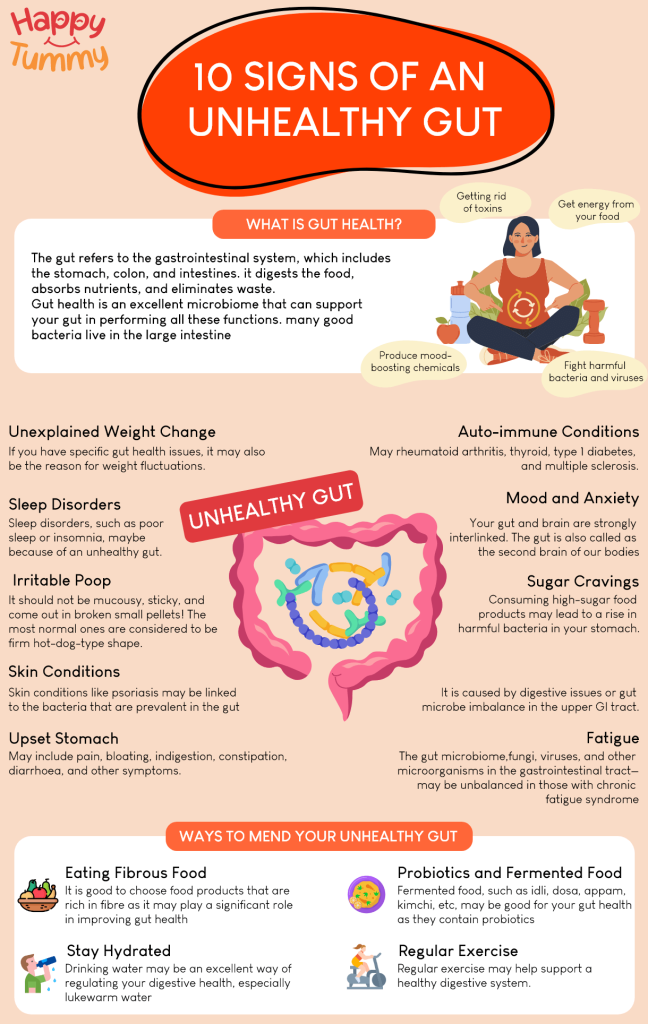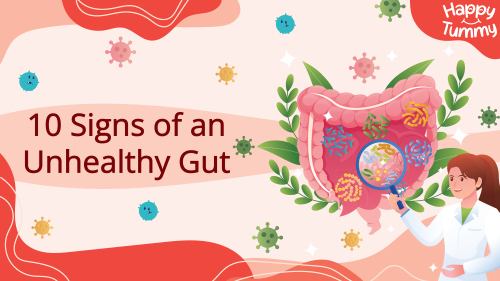Table of Contents
Digestive health is becoming a common cause of concern, and if you have one, you are not alone.
These issues can be acidity, leaky gut, or upset stomach. Many things impact your gut health, such as genetics, family history, lifestyle, and how your body is built. While a few factors can be managed, few aspects such as genetics can be hardly controlled.
Still, you must know what the common indications of an unhealthy gut are.
After all, identification is the key to prevention or cure!
What is Gut Health?
The gut refers to the digestive system, starting from the mouth and ending at the anus. It includes the stomach, colon, and intestines. It digests the food, absorbs nutrients, and eliminates waste.
Gut health is an excellent microbiome or balanced gut flora that can support your gut in performing all these functions. Many good bacteria live in the large intestine [1].
These bacteria help break food and absorb the nutrients that your body uses for various things. Your gut needs good bacteria to remain healthy, as it can impact your mental and physical health.
The Gut Feeling
The Gut Feeling or intuition which we commonly call it, originates in deeper parts of us, mainly through the brain processing. But, why do we call it a gut feeling if it is the outcome of the brain????
Intrigued??
It shows a strong gut-brain connection! This is also the reason you might face gastrointestinal distress when you are anxious or fearful.
You might have faced it sometimes when you are going for an exam or a critical meeting. Now you know the reason why all that gutur gutur happens in the stomach!
The key point is to take care of your gut to stay psychologically healthy. The reverse is also true.
Why is Gut Health Important?
A healthy gut or stomach means having an adequate balance of microbes or bacteria in your gastrointestinal tract. Your body needs them for the following reasons:
- Get energy from your food
- Produce mood-boosting chemicals [2]
- Getting rid of toxins
- Fight harmful bacteria and viruses
Do you know how your gut health is performing? If you don’t, take a two-minute Digestive Quotient Test by Aashirvaad and figure out your gut health instantly.
10 Signs of an Unhealthy Gut to Watch Out
Here are the ten signs to watch out and know that you have an unhealthy gut:

#1. Frequently Upset Stomach
An upset stomach may include bloating, indigestion, constipation, diarrhoea, irregular bowel movement, and other symptoms. All these are signs that your gut is not performing correctly.
When you experience bloating or any other upset stomach issues, it means the gut is not breaking down the food as it should [3].
Also, the frequency and type of bowel movements tell a lot about your digestive or gut health. If you have chronic constipation or pass hard stool, it may mean gut bacteria imbalance or slow digestion.
#2 Irritable Poop
Your poop is a significant indicator of your gut health! So, it is imperative to observe its size, colour, and consistency. It should not be mucousy, sticky, and come out in broken small pellets! The most normal ones are considered to be firm hot-dog-type shapes.
If it floats, is too firm, or is too soft, it might indicate issues with digestion or a lack of fibre intake. You should see a doctor if you notice undigested food because it might indicate some underlying condition as well.
Regarding timings, pushing it out in less than a minute might be a good indicator of your health. Though some people might take a few more minutes, it should not typically exceed 10-15 minutes to pass it out.
#3. Cravings and Hunger Bangs
Consuming high-sugar food products may lead to a rise in harmful bacteria in your stomach. This may further lead to inflammation and become a reason for an unhealthy gut [5].
Several proteins secreted by gut bacteria resemble the hormones that control appetite, like ghrelin and leptin. These proteins may impact your food cravings.
Bacteria trigger humans to consume the nutrients that support them. That means that consuming a lot of sugar feeds the harmful bacteria that thrive on it, and the bacteria release proteins that increase your desire for sugar and hunger bangs.
#4. Unexplained Weight Change
There can be many things linked to rapid weight gain or loss. However, if you have specific gut health issues, it may also be the reason for weight fluctuations.
It is because your gut influences how your body stores the nutrients. Thus, it may also impact and affect your body weight [6].
#5. Sleep Disorders
Sleep disorders, such as poor sleep or insomnia, may be because of an unhealthy gut. Most hormones, including serotonin, are generated in the stomach, which may impact mood and sleep.
As a result, intestinal health may impair general health and lower sleep quality [7].
#6. Fatigue and Frequent Illness
The gut microbiome—made up of bacteria, fungi, viruses, and other microorganisms in the gastrointestinal tract—may be unbalanced in those with chronic fatigue syndrome [8]. Eventually, it might lead to frequent health issues.
People who feel more tired may also be linked to irritable bowel syndrome.
#7. Auto-immune Conditions
You may have auto-immune conditions, such as rheumatoid arthritis, thyroid, type 1 diabetes, and multiple sclerosis. Though there can be different causes of these conditions, we can’t ignore harmful gut bacteria [9].
When gut bacteria get perturbed, the immune system can mistakenly and erroneously instigate undesirable autoimmune processes.
#8. Skin Conditions
Skin conditions like psoriasis, acne, rosacea, etc., may be linked to the bacteria that are prevalent in the gut. Reduced levels of good bacteria may affect the health of your skin and immune system [10].
Nutrient deficiencies may also be linked to skin health and lead to inflamed or dry skin. The gut may play a significant role in nutrient absorption and may impact skin health.
#9. Bad Breath
Bad breath, called halitosis, is caused by digestive issues or gut microbe imbalance in the upper GI tract. It is caused by bacteria in the mouth, especially below the gumline or on the tongue.
These microorganisms degrade proteins and food particles, releasing volatile sulfur compounds that smell bad [11].
#10. Mood and Anxiety
Your gut and brain are strongly interlinked. The gut is also called as the second brain of our bodies. Your mood and sense of well-being are influenced by gut microorganisms that interact with your immune, endocrine, and brain systems [12]. An unhealthy gut can lead to fogging of the brain, deterioration of mental clarity, and frequent mood swings.
Ways to Fix Your Unhealthy Gut
If your gut is unhealthy because of not eating a proper diet and lifestyle factors, some ways may help to fix it. Let’s find them out:
#1. Eating Fibrous Food
With an unhealthy gut, there is often confusion about what to eat and what not. Choosing the food products that are healthy for your gut may be challenging.
It is good to choose food products that are rich in fibre as they may play a significant role in improving gut health [13]. Fibre may help produce short-chain fatty acids that aid in adequately functioning the colon cell lining, where most immune cells live.
For example, you may include whole grains, vegetables, fruits, and beans for a healthy and well-balanced diet.
You can check the fibre content of these food items on My Meal Plans by Aashirvaad. However, remember to control the portion size and divide these adequately throughout the day.
You can also contact Aashirvaad’s expert nutritionist to understand what must be included in your diet to maintain a healthy gut.
#2. Stay Hydrated and Balance Electrolyte
Drinking water may be an excellent way of regulating your digestive health, especially lukewarm water [14]. You can also include food that is high in water content.
Some of them are – watermelon, celery, tomatoes, and lettuce. These may help improve digestion and cleanse your colon naturally [15].
#3. Probiotics and Fermented Food
Fermented food, such as idli, dosa, appam, kimchi, etc, may be good for your gut health as they contain probiotics, which are good bacteria.
Probiotics may be able to defend against pathogens or harmful bacteria that may cause infections in your bodies, as well as promote the good bacteria already present in your bodies [16].
Tip – Use Aashirvaad’s ragi flour to make your idli and dosa for vital nutrients and fibre content.
#4. Regular Exercise
Regular exercise may help support a healthy digestive system. Engaging in physical exercise may fortify the diaphragm and abdominal wall.
It may also augment blood circulation to the digestive system’s muscles. Due to the colon’s sensitivity to movement, regularizing bowel motions might alleviate constipation [17].
#5. Boost Metabolism
Improving your metabolism can help you med your gut issues. Please try to take fibrous foods, and include herbs like ginger and black pepper. It will help you boost your digestion and metabolism.
Conclusion
Regaining your digestive health and general well-being starts with identifying the symptoms of an unhealthy gut.
It’s critical to take care of symptoms such as chronic stomach troubles, skin disorders, or mood swings before they worsen and become more severe conditions.
Although numerous variables affect gut health, lifestyle modifications like eating a balanced diet, controlling stress, and exercising frequently may make a big difference.
Consider speaking with a medical expert for specific guidance and care if you exhibit any of the ten symptoms we’ve covered.
With the appropriate strategy, you may have a happier, healthier life and bring balance back to your digestive system.
FAQs
Many underlying conditions, such as upset stomach, auto-immune diseases, sugar cravings, sleep issues, or skin health, may contribute towards an unhealthy gut.
A few things that may help in fixing an unhealthy gut include:
· Eating a balanced and fibre-rich diet.
· Drinking water, including fermented food.
· Doing regular exercising.
Some signs that you have a healthy gut include normal stool, healthy skin, and a clear mind.
You may include ginger tea, kefir, apple cider vinegar, and green tea to maintain a healthy gut.
Healthy food items that may help heal your gut include yoghurt, oats, quinoa, cauliflower, broccoli, oranges, grapefruit, etc.















